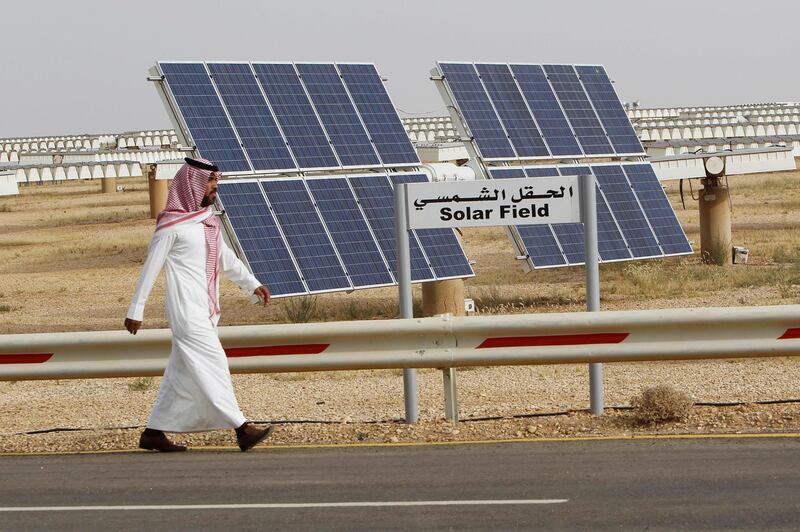Saudi Arabia, which is pushing forward with renewable energy targets for its Vision 2030, has invited 60 companies that pre-qualified to submit bids for six solar energy projects with a combined capacity of 1.5 gigawatts.
The Ministry of Energy, Industry and Mineral Resources expects the projects to attract approximately 5.2 billion Saudi riyals ($1.4bn) of private-sector investment.
The request for proposals for two smaller "Category A" projects with the capacity to produce 100 megawatts or less was opened on Thursday with a deadline of December 3. This follows the issuance in July of proposal requests for four larger "Category B" projects with a capacity of above 100MW and a deadline of November 18.
The list of companies that secured the initial qualification, published on Saudi Arabia’s Renewable Energy Project Development Office (Repdo) website, includes Masdar from Abu Dhabi.
Other successful applicants include 28 companies from Saudi Arabia and global corporations, such as American photovoltaic manufacturer First Solar, China Machinery Engineering Corporation, Korea Electric Power Corporation and Japan's Sumitomo Corporation. Applicants are classified as managing members, technical members or local managing members.
Category A projects require all three member types, while Category B projects do not need a local member. The smaller projects carry a minimum requirement of 17 per cent local content, as per regulations it is to increase the national economy's contribution of products and services.
All projects tendered are 100 per cent independent power producers that will be backed by 20 to 25-year power purchase agreements.
The six projects being tendered in round two represent the first half of this year's project development pipeline. Another six projects, in round three of the National Renewable Energy Programme (NRED), will be tendered by the last quarter of the year. Round one for 700MW of solar and wind energy projects took place in 2017, when the development office was formed.
The world's largest oil exporter has been looking to diversify its resources and recently revised its renewable energy target from 9.5GW to 27.3GW in 2024. By 2030, it wants to reach 58.7GW capacity, comprising 40GW from solar photovoltaic, 16GW from wind and 2.7GW from concentrated solar power.
Saudi Arabia's first wind power project, costing $500 million (Dh1.8bn), reached a financial close in July. The 400-MW wind farm had been awarded to a consortium led by France's EDF and Masdar.








